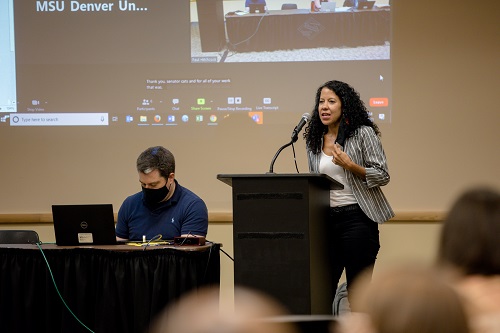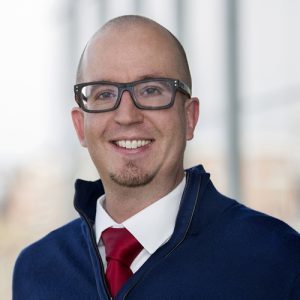
Katia Campbell, Ph.D., associate professor of communication studies/Faculty Senate President and facilitator of the Dialogues Program. Photo by Sara Hertwig

The final Metropolitan State University of Denver Faculty Senate meeting of 2021 saw a reconsideration of the meeting format for online and in-person business.
Rules Committee Chair Kelly Evans, Ph.D. (Human Performance and Sport), walked the assemblage through procedures for a potential “HyFlex” model, built upon Robert’s Rules of Order and adapted for localized implementation.
Processes involved simultaneous participation, wherein online attendees would be muted unless called on; simultaneous voting, wherein the parliamentarian would monitor the online environment and provide a secure form to ensure that only senators could vote, then combine results with in-person votes; removing online chat functionality to keep business moving; and incorporative floor discussion, wherein the parliamentarian would monitor comment requests and establish time stamps to determine speaking order.
Faculty Senate President Katia Campbell, Ph.D. (Communication Studies), noted that this discussion was simply to establish procedures and would require a two-thirds majority to change bylaws. Evans also noted that a trial run with the technology needed to incorporate HyFlex proved effective.
The subsequent vote was approved with 93% in favor.
Alex Fayman, Ph.D. (Finance), then motioned for the first Faculty Senate meeting of 2022 to adopt the HyFlex format. Courtney Rocheleau, Ph.D. (Psychological Sciences), motioned to amend this to extend the format to the entirety of the semester.
Floor discussion involved:
- Darcy Beery, CPTC (Journalism and Media Production), voiced support for the measure.
- Sandy Doe, Ed.D. (English), asked if Senate leadership would still be in person; Campbell confirmed that members of leadership would.
- Liz Goodnick, Ph.D. (Philosophy), encouraged those who were sick (or driving a vehicle) to not attend the online environment.
- Edgar Maldonado, Ph.D. (Computer Information Systems), asked for suggested language to help set expectations for students who might not have similar flexibility if the measure passed.
- Erin Seedorf, Dr.P.H. (Health Professions), voiced support for the measure as a pandemic-driven public-health accommodation.
- Gabrielle Katz, Ph.D. (Earth and Atmospheric Sciences), noted the nebulousness of the Hyflex model application for Covid accommodations or more generalized accessibility, asking for clarification on scope and depth.
- Campbell suggested a midsemester survey to reevaluate.
- Jessica Weiss, Ph.D. (Art History), asked for clarification on login-information accessibility; Evans confirmed this would be available before each meeting.
With a subsequent vote of 70 in favor and 11 opposed, the measure surpassed the two-thirds majority threshold required to change Senate bylaws and the HyFlex model was adopted to start with the Jan. 19 meeting.
In other matters, Katz provided a brief update of recommendations from the Faculty Workload Task Force. She indicated that the process is in the discussion period; the group is looking to finalize the proposed recommendations by early March and advance the approval process. Senators are invited to submit feedback via the Qualtrics form linked in the cover letter before Feb. 11 and should email Katz or Bill Henry, Ph.D., vice provost for Faculty Affairs, for further information.
Faculty Trustee Bethany Fleck Dillen, Ph.D. (Psychological Sciences), also noted that Faculty Workload Task Force forums will take place online toward the end of January or early February. Exact dates are still being determined and will be emailed to all senators. Dillen asked recipients to share with their departments.
Weiss provided updates from the Academic Policy Committee, inviting Michael Nguyen, director of Enrollment Systems and Operations, to explain details of the proposal to remove the maximum-credit-transfer rule. Nguyen discussed lifetime maximum amounts and Satisfactory Academic Progress as related to financial-aid award eligibility.
Weiss noted that unintended effects may be possible if students are transferring in large amounts of credit (greater than 150 credit hours) without a degree. But Nguyen said that was unlikely and could be addressed on a case-by-case basis.
A vote following this second read was approved with 85% in favor.
Additional Academic Policy Committee items included:
- A second read of the grade-appeal language to include the School of Hospitality as a representative body. The vote was passed with 92% approval.
- A second read of the proposal to have the Student Bill of Rights language in the Undergraduate Catalog be directly mirrored from the statute instead of paraphrased. Ninety percent voted to pass the measure.
- An update that a previously discussed “banking” policy involved matters of compensation and labor, so it would be rerouted to the Handbook Committee and return to the Senate for consideration.
- Technical changes that didn’t require a vote, including updating the contact name and title for the associate director of advising intervention in the warning/probation/suspension policy; title and office info for the provost/executive vice president for Academic Affairs in the grade-appeal policy; orientation name and contact info; and International Baccalaureate credit tables to reflect changes from the Colorado Department of Higher Education.
Other items of business included:
- Campbell addressed concerns stemming from the Nov. 3 meeting’s vote to move fully online immediately, noting the continued dedication to keep meetings accessible within constraints faced over the semester and incorporative of varying viewpoints. “I want to recognize (that) not everyone was happy, which is a natural response. … But we’re going to continue to focus on the fact that we have goodwill and are committed to the work we do here serving our students,” she said.
- Richard Wagner, Ph.D. (Earth and Atmospheric Sciences), invited attendees to a virtual town hall put on by the MSU Denver Faculty Foundation to discuss implications of a proposed bill on collective bargaining for public employees.
- Marcia Walsh-Aziz, Ph.D. (Speech, Language, Hearing Sciences), announced an upcoming Faculty Learning Committee on the benefits and logistics of ability-based interdisciplinary research. Those interested should contact Liz Kleinfeld, Ph.D.
- Meredith Jeffers, Ph.D. (Modern Languages), provided a comprehensive update from the Curriculum Committee, thanking members for the smoother semester, which met with unanimous approval.
- Campbell thanked everyone for their service and wished all a safe and happy holiday break.
The first Senate meeting for the spring semester, in HyFlex format, is scheduled for Jan. 19 at 3:20 p.m.
Login and technical information will be sent to senators prior to the start.


